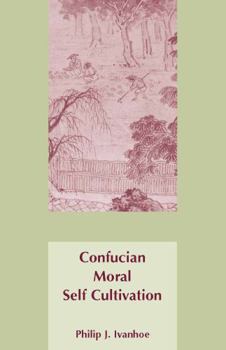Confucian Moral Self Cultivation
Select Format
Select Condition 
Book Overview
This work traces the evolution of the concept of moral self cultivation in the Chinese Confucian tradition. It begins with an introduction which describes the pre-philosophical development of ideas... This description may be from another edition of this product.
Format:Paperback
Language:English
ISBN:0872205088
ISBN13:9780872205086
Release Date:March 2000
Publisher:Hackett Publishing Company
Length:152 Pages
Weight:0.42 lbs.
Dimensions:0.2" x 5.5" x 8.5"
Customer Reviews
4 ratings
Superb!
Published by Thriftbooks.com User , 21 years ago
The Confucian tradition [of moral self cultivation] spanning over 2,500 years - Kongzi ("Confucius" - 551-479 B.C.E.), Mengzi ("Mencius" - 391-308 B.C.E.), Xunzi ("Hsun Tzu" - 310-219 B.C.E.), Zhu Xi (1130-1200 C.E.), Wang Yangming (1472-1529 C.E.), Yan Yuan (1635-1704 C.E.), Dai Zhen (1723-1777 C.E.) - in a nutshell! Organized, clear, concise, superb! Enriching endnotes with works cited for further research/reading.A highly recommended first text reading for an overview of Chinese philosophy for the professor of Chinese philosophy to student or layperson!
A Must Buy
Published by Thriftbooks.com User , 22 years ago
Excellant book, well written. Conveys core ideas succinctly. Uses modern spellings. This book has chapters on 7 Confucian masters: (1) Kongzi (Confucius), (2) Mengzi (Mencius), (3) Xunzi (Hsun Tzu), (4) Zhu Xi (Chu Hsi), (5) Wang Yangming, (6) Yan Yuan, and (7) Dai Zhen. Then there is a four page long conclusion where he discusses different models of self cultivation. A thoughtful and educational book. There are many aspects of Confucianism, but this book focuses on self-cultivation. It was enlightening and stimulating, yet kind of academic. For a more practical view of how Confucianism can be applied in your life, see "Achieve Lasting Happiness, Timeless Secrets to Transform Your Life" by Robert Canright.
Buy this book!
Published by Thriftbooks.com User , 22 years ago
If you are a beginner or student of Chinese philosophy, you should buy this book. This is a great introduction to Confucian thinkers written in accessible and clear language. I found it to be extremely easy to read and very easy to understand. Like the anthology he co-edited with Dr. Van Norden (whose review is below), this book is excellent. And it is very reasonably priced as well. - J. McCausland
Excellent overview!
Published by Thriftbooks.com User , 24 years ago
Ivanhoe provides a readable and reliable overview of some of the major figures in Confucianism from over 2,500 years. Each Confucian is discussed in terms of two themes: the relative emphasis he gives to study and reflection, and his conception of human nature. Confucius himself was somewhat ambiguous on these points (leading to much dispute among later followers). Mencius, since he believed that human nature is good, said that reflection on our innate instincts could provide us with ethical guidance. Xunzi disagreed with Mencius, arguing that human nature is bad, so we must study to reform our nature. Later Confucians like Zhu Xi and Wang Yangming were deeply influenced by the Buddhist notion of a transpersonal self that all humans share. However, Zhu Xi thought that our selfish desires heavily obscured our good, original nature, so we must study in order to better understand our own nature. In contrast, Wang Yangming, while recognizing the danger of selfish desires, warned against the dangers of purely academic study. He held that each of us has, prior to study, the ability to exercise a "pure knowing," through which we both know the good and will act in accordance with it.I use this book a lot in my classes: I recommend it highly.(This book is a revised version of a much more expensive hardback edition published by Peter Lang.)





